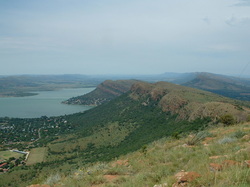An aside: “Setswana” is the language; the country of “Botswana”, neighboring South Africa, is literally the “land of the Tswana.”
Bantu languages have several interesting features. They tend to be tonal languages, which means that saying something with a rising, falling, or neutral inflection changes the meaning of the world. It also gives the languages a sort of musical quality. In Setswana, like Spanish, the accent is generally placed on the penultimate syllable, which also adds cadence. As one Tswana speaker said to me, “English is flat, Setswana rolls.”
Bantu languages also have many noun classes. If you know Spanish or French then you can understand feminine or masculine words as noun classes. Bantu languages tend to have anywhere from 10 to 20 noun classes, and unlike Romance languages, verbs conjugate differently with nouns from different classes. In addition, conjugation can take place at either the front or the end of the verb, so you have to train your ear to listen for the verb stem in the middle of the word.
If all this is too abstract, try reading through the examples below and you will see what I mean.
Go tshameka - to play
ngwana - a child
bana - children
ngwana watshameka- the child plays
bana batshameka - the children play
monna- man
banna-men
Go bona - to see
monna obona ngwana- the man sees the child
banna babona bana- the men see the children
monna obona bana batshameka – the man sees the children play

